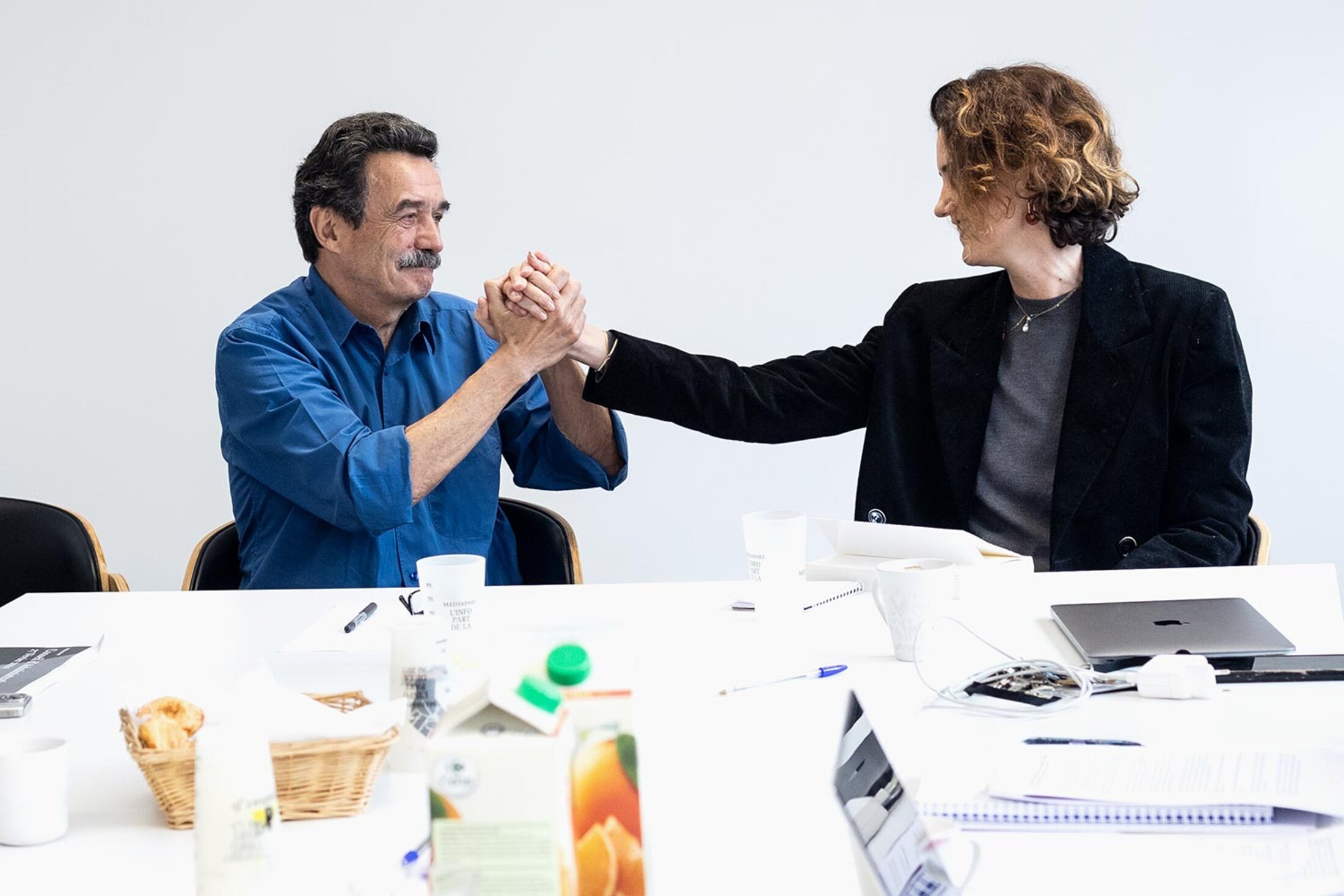At the end of an internal process that began two years ago, from which emerged a choice that was obvious, I proposed to Mediapart’s governing board that Carine Fouteau should become the president of our publishing enterprise and publishing editor of our journal. The proposal was unanimously adopted by the board, on which our staff have a majority, on February 27th.
Carine Fouteau has been part of the Mediapart adventure since its very beginning, in 2008. Sharing the ideals of independence that motivated the co-founders (see Carine explaining why she joined Mediapart in this video from February 2008), she had taken the risk of leaving Les Échos, just as the financial daily was bought by the billionaire Bernard Arnault, and where she had been working since 1999, reporting on workplace conditions and, later, societal issues. In parallel, she also contributed to the excellent review Vacarme, which has now sadly folded.
At Mediapart, Carine reported on migratory issues over a period of ten years, during which she demonstrated a generous curiosity about the world and others, and which echoed her personal path in life: she spent part of her childhood and youth abroad, in Iran and Norway and, after graduating from Paris 1 university with a history degree, followed by further studies at political sciences school Sciences Po Paris, she completed a master’s degree in journalism at New York University. Her reporting – notably in Ukraine last year, but also in the Paris suburbs of Seine-Saint-Denis during the French presidential elections in 2012 – is illustrative of that insatiable curiosity, as also her energetic involvement in our campaign #OpenEurope.

Enlargement : Illustration 1

Constant, Carine’s professional investment in questions of migration, hospitality and discrimination has been at the heart of Mediapart’s commitments ever since its launch. More recently still, it was she who took position, in our collective name, against France’s new law on immigration and the xenophobia that inspired it. She has also covered the persistent presence of French colonialism, notably in a 2018 series of reports from New Caledonia.
Ten years after Mediapart’s launch, it was quite naturally that she took over, in a joint role, the reins of our editorial team, succeeding our co-founder François Bonnet. From March 2018 to June 2023, she shared the post of editor with Stéphane Alliès, who is now in charge of the publication of Mediapart’s daily editions. Under their joint editorship, attentive and efficient, Mediapart saw five years of spectacular progression to the point of reaching a landmark 200,000 subscribers (which has now grown to 220,000), accompanied by a significant growth in staff numbers, now totalling nearly 140, half of which are journalists.
A collective story
The choice of Carine as my successor was thus a logical one. Passing the relay to her in good order marks the conclusion of a process that has been long prepared by the co-founders of Mediapart, who were determined to hand over the reins to the generation which joined us and accompanied us. Carine is emblematic of that generation, having proven over these past 16 years her capacity to unite, to stimulate and to lead all the team, with benevolence and rigour in equal measure, in both editorial and organisational domains.
In what is an exception in the French media landscape, where most are headed by non-journalists, the statutes of Mediapart not only require the president of its publishing entity to also be its publishing editor but also, and above all, that they be a journalist. Beyond the symbol, it is a pledge that no interest outside of news reporting – at the service of the public interest and the right to know – can interfere with the workings of our journal and its professional collective.
Whatever the high profile acquired by some among us, Mediapart is first and foremost a collective enterprise which has transformed all of us. That is also the significance of this tranquil succession which frees our journal from what has been a sometimes burdensome personalisation regarding myself. That is, to not reduce a profession, an enterprise, and a team to just one personality, and which risks obscuring the richness and diversity of a collective of individuals. Coming from within that collective, Carine will be its driver and spokesperson.
Following Mediapart’s achievements and its success, this transmission was the challenge that awaited us. If, certainly, there are young folk who are quite old of mind, conformist and conservative, notably at the summit of the current French executive, our public life, that of the political sphere and economic sector, demonstrates that there are above all old people who hang on dearly to their posts, incapable of imagining a world that can survive them. It was unthinkable that Mediapart could reproduce such archaic practices which serve to impede moving forward.
A renewed management team
Right from the very beginning, and of course on condition that our gamble succeeded, the four co-founders (François Bonnet, Laurent Mauduit, Marie-Hélène Smiejan and myself) intended to place Mediapart under the control of those who work for it and who create its value. Our ambition from the start was to both transmit a profitable enterprise to its team, which would have command of it, and to ring-fence its capital to protect it from predators. Having achieved that latter ambition in 2019, it would have been contrary to our aims to impose ourselves, on the pretext of Mediapart’s success, for longer than was reasonable.
It was thus that, after inventing and creating the Fonds pour une presse libre (the Fund for a free press, or FPL) which, via the Société pour la protection de l’indépendance de Mediapart (SPIM), guarantees the financial independence of our journal, free of any private shareholder, we went about progressively, one by one, standing down from our management roles.
After handing over his post as editor to Stéphane Alliès et Carine Fouteau in 2018, François Bonnet, who continues to regularly contribute to Mediapart, became chairman of the FPL in 2022.
Similarly, Laurent Mauduit, who also continues to contribute to Mediapart, stood down from its board of governors at the end of 2020, handing over his seat to Fabrice Arfi, joint head of our investigations desk, of which he is an emblematic figure.
Finally, in 2023, co-founder Marie-Hélène Smiejan stood down as general manager, passing the relay to Cécile Sourd (see this interview with Marie-Hélène in March 2023 in our programme ‘Abonnez-vous’, and listen to this podcast with Cécile). Marie-Hélène today presides over the entity that ultimately guarantees the ring-fencing of Mediapart’s independence, the Association pour le droit de savoir (ADS), of which the co-founders are ex officio members along with Mediapart journalist Martine Orange.
So it is that now my turn has come to hand over the management of this press enterprise – totally independent, totally digital, totally participative – that has no equivalent. All the more so in that to its originality is added its profitability, which has been constant since 2011 and which was further confirmed by our 2023 results.
We owe this success to you who support us through your subscriptions, which provides our only income. But beyond this economic guarantee of our independence, this unfailing bond between Mediapart and its public shows also that it lives in tune with our times, accompanying the challenges and espousing the hopes that arise from them.
The best evidence of that is this final image that we did not arbitrarily decide upon but which naturally imposed itself, that of a media organisation that is now led by a team of four women; Carine Fouteau as its president, Cécile Sourd as its general manager, and Lénaïg Bredoux and Valentine Oberti as its joint editors.

Enlargement : Illustration 2

This has not come about by accident, for the role of Mediapart in the #MeToo revolution has also transformed us. In every part of the world, and whatever the regime, the cause of women transports the issue of equality all the way to its point of incandescence, by refusing any supposedly natural hierarchy founded on gender. As such, it reinforces all other causes for equality, whether they be social or political, in face of discrimination regarding one’s origin, appearance, and faith, etc.
In our worried and uncertain times, this equality of rights is an irreplaceable compass with regard to questions of domestic politics as much as to international events. Mediapart claims its part in that, in the same manner as all those who call for emancipation, and who refuse to be confined because of their origin, gender, condition etc. It is a battle that will never finish, always a work in progress, forever recommencing, in face of the confiscation of the common good by those who abuse, who seek to dominate and who monopolize.
Taking part in that combat, Mediapart is giving a fresh face to a long tradition. By becoming the first French daily journal under an all-women management, it is remindful of La Fronde, that well-named French daily created at the end of the 19th century by the feminist Marguerite Durand, and which employed only women, including its typographers. One of its most celebrated contributors was Séverine (1855-1929), the pen name of Caroline Rémy de Guebhard who wrote Notes d’une frondeuse. Séverine was introduced to journalism by Jules Vallès, the author of L’insurgé, and after his death she took charge of his daily, Le Cri du people (The cry of the people), indissociable from the Paris Commune.
Séverine was a woman who stood tall, who was free and libertarian, passionate and determined, defiant and resistant. Just as is the team which, with Carine Fouteau as its head, now has the destiny of Mediapart within its hands.
-------------------------
- The original French version of this article can be found here.
English version by Graham Tearse


